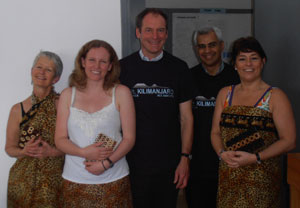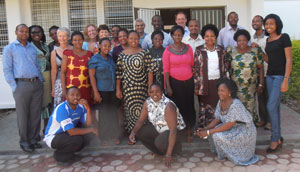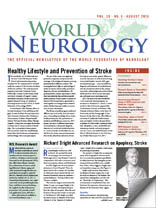
PDNS Course faculty wearing their gifts.
There is limited access to diagnosis and treatment of Parkinson’s disease (PD) in Sub-Saharan Africa (SSA) with few neurologists. PD nurse specialists (PDNS) have become an integral component of multidisciplinary PD care in the U.K. and may be particularly useful in SSA with the lack of specialist doctors. We therefore conducted a PDNS course for East Africa in Moshi, northern Tanzania with joint funding from the World Federation of Neurology (WFN) and the Movement Disorder Society (MDS).
Invitations were sent to different countries throughout East Africa. Nurses needed to be working within a neurology department with a likelihood of caring for PD patients after the course. We had participants from Rwanda (3), Uganda (1), Ethiopia (2), Kenya (4), with two also invited from Nigeria and the remaining 10 from Tanzania, including two occupational therapists and three physiotherapists. The faculty comprised of Richard Walker and Catherine Dotchin (geriatricians with an interest in PD from the U.K.), Louise Ebenezer and Lynda Hind (PDNS from the U.K.) and Juzar Hooker, consultant neurologist (Nairobi, Kenya). Local contributions were also provided by Victor Minde (physiotherapy) and Oliva Msuya (PDNS).
The course was run in English and included diagnosis, drug treatment, motor symptoms, non-motor symptoms, physiotherapy and information provision. At the beginning of the course, we had a round of introductions by the faculty and the course participants in which people talked about their previous experience with movement disorders and the background on the care of movement disorders in the place, and country, where they worked.

Parkinson’s Disease Nurse Specialist (PDNS) Course participants and faculty.
The course was primarily classroom based with interactive sessions conducted around PowerPoint presentations from the faculty covering all aspects of PD. There was a particular emphasis on areas that were of specific relevance to Africa, such as health beliefs about the symptoms of PD, and how this affects health seeking behavior; as an example, seeking help from traditional healers as these symptoms are not felt to be a medical problem. Expensive interventions, such as deep brain stimulation, were mentioned, but not in great detail as these are not available in the majority of African countries. We plan to develop appropriate information for SSA in English, which will then be translated into local languages as required. On one afternoon, two local PD patients attended to tell the participants what it was like to live with PD, and this also allowed demonstration of physical signs.
Useful websites, including the MDS and Parkinson’s U.K., were demonstrated. Each participant has been given a U.K. PDNS as an email mentor and will produce a report after six months giving details of the numbers of patients with PD they have seen, and the clinical spectrum, as well as the challenges where they work. We also plan to keep participants updated via email of any new relevant developments. Hopefully, this will ensure ongoing interest and contact between the participants themselves, and between the participants and the faculty and mentors.
Despite many challenges, not least getting the participants to Moshi, the course was a great success in large part due to the excellent hosting by Marycelina Msuya, dean of Nursing, and her colleagues at the Nursing School. The group as a whole bonded well as the week went by, and the course was very interactive. They are keen to provide ongoing mutual support. Despite the many other challenges to the care for PD patients in SSA, such as access to affordable and sustainable drug treatment, we have raised awareness and established a cohort of interested and educated health professionals to help take on the challenge.
Evaluation was positive. In September 2013, we will be running a similar course for PDNS in Anglophone West Africa in Accra, Ghana, funded by MDS. This will run in conjunction with a course for non-specialist doctors in Ghana, and other West African countries, which has been jointly funded by WFN and MDS. We hope to run similar courses in other regions of Africa in the future. We are grateful for the support of WFN.
Walker is consultant physician for North Tyneside General Hospital and honorary professor of aging and international health, Institute of Health and Society, Newcastle University.
Editor’s Note
Other faculty members for the course are: Catherine Dotchin, consultant geriatrician at North Tyneside General Hospital, Louise Ebenezer, Parkinson’s disease nurse specialist and Welsh PDNS course convener at Princess of Wales Hospital, Bridgend, Lynda Hind, PDNS, information adviser for Parkinson’s UK, London, and Juzar Hooker, consultant neurologist, Aga Khan University Hospital, Nairobi, Kenya.
